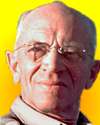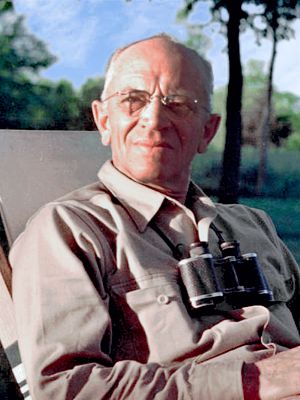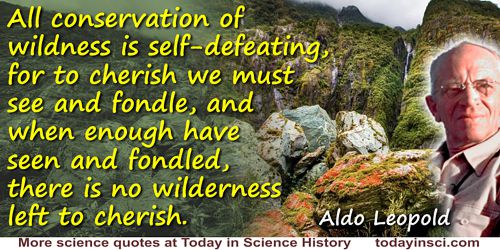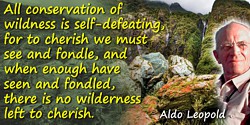 (source)
(source)
|
Aldo Leopold
(11 Jan 1887 - 21 Apr 1948)
American conservationist as well as a forester, philosopher, educator, writer, outdoor enthusiast and co-founder (in 1935) of the Wilderness Society.
|
Science Quotes by Aldo Leopold (47 quotes)
[Two college boys on the Flambeau River in a canoe]… their watches had run down, and for the first time in their lives there was no clock, whistle, or radio to set watches by. For two days they had lived by “sun-time,” and were getting a thrill out of it. No servant brought them meals: they got their meat out of the river, or went without. No traffic cop whistled them off the hidden rock in the next rapids. No friendly roof kept them dry when they misguessed whether or not to pitch the tent. No guide showed them which camping spots offered a nightlong breeze, and which a nightlong misery of mosquitoes; which firewood made clean coals, and which only smoke.
— Aldo Leopold
In 'Wisconsin: Flambeau', A Sand County Almanac, and Sketches Here and There (1949, 1987), 112-113.
[Two college boys on the Flambeau River in a canoe]…their first…taste of freedom … The elemental simplicities of wilderness travel were thrills not only because of their novelty, but because they represented complete freedom to make mistakes. The wilderness gave them their first taste of those rewards and penalties for wise and foolish acts which every woodsman faces daily, but against which civilization has built a thousand buffers. These boys were “on their own” in this particular sense. Perhaps every youth needs an occasional wilderness trip, in order to learn the meaning of this particular freedom.
— Aldo Leopold
In 'Wisconsin: Flambeau', A Sand County Almanac, and Sketches Here and There (1949, 1987), 112-113.
Acts of creation are ordinarily reserved for gods and poets, but humbler folk may circumvent this restriction if they know how. To plant a pine, for example, one need be neither god nor poet; one need only own a shovel. By virtue of this curious loophole in the rules, any clodhopper may say: Let there be a tree—and there will be one.
— Aldo Leopold
In 'December: Pines above the Snow', A Sand County Almanac, and Sketches Here and There (1949, 1987), 81.
All conservation of wildness is self-defeating, for to cherish we must see and fondle, and when enough have seen and fondled, there is no wilderness left to cherish.
— Aldo Leopold
In 'Wisconsin', A Sand County Almanac, and Sketches Here and There (1949, 1987), 101.
Becoming serious is a grievous fault in hobbyists. It is an axiom that no hobby should either seek or need rational justification. To wish to do it is reason enough. To find reasons why it is useful or beneficial converts it at once from an avocation into an industry–lowers it at once to the ignominious category of an 'exercise' undertaken for health, power, or profit. Lifting dumbbells is not a hobby. It is a confession of subservience, not an assertion of liberty.
— Aldo Leopold
From 'A Man’s Leisure Time' (1920), collected in Luna B. Leopold (ed.) Round River: From the Journals of Aldo Leopold (1953, 1972), 4.
Civilization has so cluttered this elemental man-earth relationship with gadgets and middlemen that awareness of it is growing dim. We fancy that industry supports us, forgetting what supports industry.
— Aldo Leopold
In 'Wildlife in American Culture', A Sand County Almanac, and Sketches Here and There (1949, 1987), 178.
Conservation is a bird that flies faster than the shot we aim at it.
— Aldo Leopold
In Aldo Leopold and Luna B. Leopold, Round River (1972), 145.
Conservation is a state of harmony between men and land.
— Aldo Leopold
In essay "Conservation' (1953), Collected in Aldo Leopold and Luna B. Leopold, Round River (1972), 145.
Conservation is getting nowhere because it is incompatible with our Abrahamic concept of land. We abuse land because we regard it as a commodity belonging to us. When we see land as a community to which we belong, we may begin to use it with love and respect. There is no other way for land to survive the impact of mechanized man, nor for us to reap from it the esthetic harvest it is capable, under science, of contributing to culture.
— Aldo Leopold
In 'Foreword', A Sand County Almanac, and Sketches Here and There (1949, 1987), viii.
Education, I fear, is learning to see one thing by going blind to another.
— Aldo Leopold
In 'Maitoba', A Sand County Almanac, and Sketches Here and There (1949, 1987), 158.
Every farm woodland, in addition to yielding lumber, fuel, and posts, should provide its owner a liberal education. This crop of wisdom never fails, but it is not always harvested.
— Aldo Leopold
In A Sand County Almanac: and Sketches Here and There (1949, 1989), 73.
Getting up too early is a vice habitual in horned owls, stars, geese, and freight trains. Some hunters acquire it from geese, and some coffee pots from hunters.
— Aldo Leopold
In 'Too Early', A Sand County Almanac, and Sketches Here and There (1949, 1987), 59.
Having to squeeze the last drop of utility out of the land has the same desperate finality as having to chop up the furniture to keep warm.
— Aldo Leopold
…...
I am tempted to conclude that a satisfactory hobby must be in large degree useless, inefficient, laborious, or irrelevant. Certainly many of our most satisfying avocations today consist of making something by hand which machines can usually make more quickly and cheaply, and sometimes better. Nevertheless I must in fairness admit that in a different age the mere fashioning of a machine might have been an excellent hobby.
— Aldo Leopold
From 'A Man’s Leisure Time' (1920), collected in Luna B. Leopold (ed.) Round River: From the Journals of Aldo Leopold (1953, 1972), 4.
I was young then, and full of trigger-itch; I thought that because fewer wolves meant more deer, that no wolves would mean hunters’ paradise.… I now suspect that just as a deer herd lives in mortal fear of its wolves, so does a mountain live in mortal fear of its deer. And perhaps with better cause, for while a buck pulled down by wolves can be replaced in two or three years, a range pulled down by too many deer may fail of replacement in as many decades.
— Aldo Leopold
In 'Thinking Like a Mountain', A Sand County Almanac, and Sketches Here and There (1949, 1987), 130, 132.
If education really educates, there will, in time, be more and more citizens who understand that relics of the old West add meaning and value to the new. Youth yet unborn will pole up the Missouri with Lewis and Clark, or climb the Sierras with James Capen Adams, and each generation in turn will ask: Where is the big white bear? It will be a sorry answer to say he went under while conservationists weren’t looking.
— Aldo Leopold
Conclusion from article 'The Grizzly—A Problem in Land Planning', in Outdoor America (6 Apr 1942), 7, 12.
In our attempt to make conservation easy, we have made it trivial.
— Aldo Leopold
In 'Substitutes for a Land Ethic', A Sand County Almanac, and Sketches Here and There (1949, 1987), 210.
Individual thinkers since the days of Ezekiel and Isaiah have asserted that the despoliation of land is not only inexpedient but wrong. Society, however, has not yet affirmed their belief. I regard the present conservation movement as the embryo of such an affirmation.
— Aldo Leopold
In 'The Ethical Sequence', A Sand County Almanac, and Sketches Here and There (1949, 1987), 203.
Is education possibly a process of trading awareness for things of lesser worth?
— Aldo Leopold
In 'March: The Geese Return', A Sand County Almanac, and Sketches Here and There (1949, 1987), 18.
It is part of wisdom never to revisit a wilderness, for the more golden the lily, the more certain that someone has gilded it. To return not only spoils a trip, but tarnishes a memory.
— Aldo Leopold
In 'The Green Lagoons', A Sand County Almanac, and Sketches Here and There (1949, 1987), 141.
Leopold’s Golden Rule of Ecology: A thing is right when it tends to preserve the integrity, stability and beauty of the biotic community. It is wrong when it tends otherwise.
— Aldo Leopold
In 'The Land Ethic: The Outlook', A Sand County Almanac, and Sketches Here and There (1949, 1987), 224-225.
Man always kills the thing he loves, and so we the pioneers have killed our wilderness. Some say we had to. Be that as it may, I am glad I shall never be young without wild country to be young in. Of what avail are forty freedoms without a blank spot on the map?
— Aldo Leopold
Concluding paragraph of 'Chihuahua and Sonora', A Sand County Almanac, and Sketches Here and There (1949, 1987), 148-149.
My earliest impressions of wildlife and its pursuit retain a vivid sharpness of form, color, and atmosphere that half a century of professional wildlife experience has failed to obliterate or improve on.
— Aldo Leopold
In 'Red Legs Kicking', A Sand County Almanac, and Sketches Here and There (1949, 1987), 120.
No matter how intently one studies the hundred little dramas of the woods and meadows, one can never learn all the salient facts about any one of them.
— Aldo Leopold
In 'April: Sky Dance', A Sand County Almanac, and Sketches Here and There (1949, 1987), 32-33.
Nonconformity is the highest evolutionary attainment of social animals.
— Aldo Leopold
From 'A Man's Leisure Time', (1920), collected in Aldo Leopold and Luna B. Leopold (ed.) Round River (1966, 1991), 27.
On motionless wing they emerge from the lifting mists, sweep a final arc of sky, and settle in clangorous descending spirals to their feeding grounds. A new day has begun on the crane marsh.
— Aldo Leopold
In 'Wisconsin: Marshland Elegy', A Sand County Almanac, and Sketches Here and There (1949, 1987), 95.
Only the mountain has lived long enough to listen objectively to the howl of a wolf.… Mountains have a secret opinion about them.… Our rifles were empty, the old wolf was down… We reached the old wolf in time to watch a fierce green fire dying in her eyes. I realized then, and have known ever since, that there was something new to me in those eyes—something known only to her and to the mountain.
— Aldo Leopold
Only the mountain has lived long enough to listen objectively to the howl of a wolf.… Mountains have a secret opinion about them.… Our rifles were empty, the old wolf was down… We reached the old wolf in time to watch a fierce green fire dying in her eyes. I realized then, and have known ever since, that there was something new to me in those eyes—something known only to her and to the mountain.
— Aldo Leopold
In 'Thinking Like a Mountain', A Sand County Almanac, and Sketches Here and There (1949, 1987), 129-130.
Our ability to perceive quality in nature begins, as in art, with the pretty. It expands through successive stages of the beautiful to values as yet uncaptured by language.
— Aldo Leopold
In A Sand County Almanac, and Sketches Here and There (1949, 1987), 96.
Our appreciation of the crane grows with the slow unraveling of earthly history. His tribe, we now know, stems out of the remote Eocene. The other members of the fauna in which he originated are long since entombed within the hills.
— Aldo Leopold
In A Sand County Almanac, and Sketches Here and There (1949, 1987), 96.
Some paintings become famous because, being durable, they are viewed by successive generations, in each of which are likely to be found a few appreciative eyes.
I know a painting so evanescent that it is seldom viewed at all, except by some wandering deer. It is a river who wields the brush, and it is the same river who, before I can bring my friends to view his work, erases it forever from human view. After that it exists only in my mind's eye.
Like other artists, my river is temperamental; there is no predicting when the mood to paint will come upon him, or how long it will last. But in midsummer, when the great white fleets cruise the sky for day after flawless day, it is worth strolling down to the sandbars just to see whether he has been at work.
— Aldo Leopold
In 'The Green Pasture', A Sand County Almanac, and Sketches Here and There (1949, 1987), 51.
Tell me of what plant-birthday a man takes notice, and I shall tell you a good deal about his vocation, his hobbies, his hay fever, and the general level of his ecological education.
— Aldo Leopold
In 'Prairie Birthday', A Sand County Almanac, and Sketches Here and There (1949, 1987), 44. [Birthday refers to the time of first blooming.]
That land is a community is the basic concept of ecology, but that land is to be loved and respected is an extension of ethics. That land yields a cultural harvest is a fact long known, but latterly often forgotten.
— Aldo Leopold
In 'Foreword', A Sand County Almanac, and Sketches Here and There (1949, 1987), viii-ix.
The cowman who cleans his range of wolves does not realize that he is taking over the wolf’s job of trimming the herd to fit the range. He has not learned to think like a mountain. Hence we have dustbowls, and rivers washing the future into the sea.
— Aldo Leopold
In 'Thinking Like a Mountain', A Sand County Almanac, and Sketches Here and There (1949, 1987), 132.
The last word in ignorance is the man who says of an animal or plant: “What good is it?” If the land mechanism as a whole is good, then every part is good, whether we understand it or not.
— Aldo Leopold
From 'Conservation' (c.1938), Round River: From the Journals of Aldo Leopold (1953), 141. Collected in The Essential Aldo Leopold: Quotations and Commentaries (1999), 142.
The practices we now call conservation are, to a large extent, local alleviations of biotic pain. They are necessary, but they must not be confused with cures. The art of land doctoring is being practiced with vigor, but the science of land health is yet to be born.
— Aldo Leopold
In 'Wilderness for Science', A Sand County Almanac, and Sketches Here and There (1949, 1987), 195-196.
The problem, then, is how to bring about a striving for harmony with land among a people many of whom have forgotten there is any such thing as land, among whom education and culture have become almost synonymous with landlessness. This is the problem of conservation education.
— Aldo Leopold
In 'Conservation' (1938), collected in Luna B. Leopold (ed.), Round River: From the Journals of Aldo Leopold (1966, 1972), 155.
This sounds simple: do we not already sing our love for and obligation to the land of the free and the home of the brave? Yes, but just what and whom do we love? Certainly not the soil, which we are sending helter-skelter downriver. Certainly not the waters, which we assume have no function except to turn turbines, float barges, and carry off sewage. Certainly not the plants, of which we exterminate whole communities without batting an eye. Certainly not the animals, of which we have already extirpated many of the largest and most beautiful species.
— Aldo Leopold
In 'The Land Ethic: The Community Concept', A Sand County Almanac, and Sketches Here and There (1949, 1987), 204.
To build a road is so much simpler than to think of what the country really needs. A roadless marsh is seemingly as worthless to the alphabetical conservationist as an undrained one was to the empire-builders. Solitude, the one natural resource still undowered of alphabets, is so far recognized as valuable only by ornithologists and cranes. Thus always does history, whether or marsh or market place, end in paradox. The ultimate value in these marshes is wildness, and the crane is wildness incarnate.
— Aldo Leopold
In 'Wisconsin', A Sand County Almanac, and Sketches Here and There (1949, 1987), 101.
To save every cog and wheel is the first precaution of intelligent tinkering.
— Aldo Leopold
From 'Conservation' (c.1938), Round River: From the Journals of Aldo Leopold (1953), 146-147. Collected in The Essential Aldo Leopold: Quotations and Commentaries (1999), 142.
To those devoid of imagination a blank place on the map is a useless waste; to others, the most valuable part.
— Aldo Leopold
In A Sand County Almanac, and Sketches Here and There (1949, 1987), 176.
Today the invention of a new machine, however noteworthy to industry, would, as a hobby, be trite stuff.… A hobby is a defiance of the contemporary. It is an assertion of those permanent values which the momentary eddies of social evolution have contravened or overlooked. If this is true, then we may also say that every hobbyist is inherently a radical, and that his tribe is inherently a minority.
— Aldo Leopold
From 'A Man’s Leisure Time' (1920), collected in Luna B. Leopold (ed.) Round River: From the Journals of Aldo Leopold (1953, 1972), 4.
Twenty centuries of “progress” have brought the average citizen a vote, a national anthem, a Ford, a bank account, and a high opinion of himself, but not the capacity to live in high density without befouling and denuding his environment, nor a conviction that such capacity, rather than such density, is the true test of whether he is civilized.
— Aldo Leopold
In Game Management (1933), 423.
We shall be ready, I think, to practice conservation when “farmer plants tamarack” is no longer news.
— Aldo Leopold
In Aldo Leopold and Luna B. Leopold, Round River (1972), 64.
We shall never achieve harmony with land, any more than we shall achieve justice or liberty for people. In these higher aspirations the important thing is not to achieve, but to strive.
— Aldo Leopold
In 'Conservation' (1938), collected in Luna B. Leopold (ed.), Round River: From the Journals of Aldo Leopold (1966, 1972), 155.
When I call to mind my earliest impressions, I wonder whether the process ordinarily referred to as growing up is not actually a process of growing down; whether experience, so much touted among adults as the thing children lack, is not actually a progressive dilution of the essentials by the trivialities of living.
— Aldo Leopold
In 'Red Legs Kicking', A Sand County Almanac, and Sketches Here and There (1949, 1987), 120.
Wilderness areas are first of all a series of sanctuaries for the primitive arts of wilderness travel, especially canoeing and packing. I suppose some will wish to debate whether it is important to keep these primitive arts alive. I shall not debate it. Either you know it in your bones, or you are very, very old.
— Aldo Leopold
In 'Wilderness for Recreation', A Sand County Almanac, and Sketches Here and There (1949, 1987), 193.
See also:
- 11 Jan - short biography, births, deaths and events on date of Leopold's birth.
- A Sand County Almanac: With Essays on Conservation from Round River, by Aldo Leopold. - book suggestion.



 In science it often happens that scientists say, 'You know that's a really good argument; my position is mistaken,' and then they would actually change their minds and you never hear that old view from them again. They really do it. It doesn't happen as often as it should, because scientists are human and change is sometimes painful. But it happens every day. I cannot recall the last time something like that happened in politics or religion.
(1987) --
In science it often happens that scientists say, 'You know that's a really good argument; my position is mistaken,' and then they would actually change their minds and you never hear that old view from them again. They really do it. It doesn't happen as often as it should, because scientists are human and change is sometimes painful. But it happens every day. I cannot recall the last time something like that happened in politics or religion.
(1987) -- 


